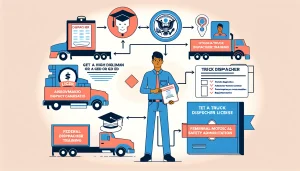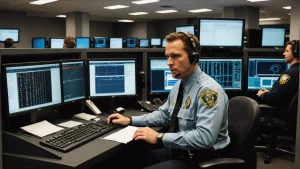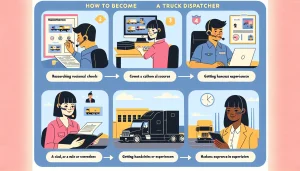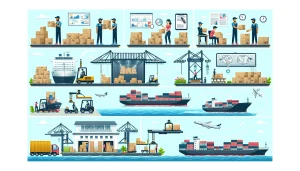What most articles won’t tell you about dispatcher training is now unveiled. Striving to excel in your dispatcher career? This is your chance to outshine others in the transportation industry. Let’s get real and avoid the generic tips. Curious about advancing as a dispatcher in the freight domain? This guide shines a light on imperative skills and pathways for success.
Mind-blowing facts about freight dispatchers’ training, which most guides shy away from, will be the game-changer in your career. This simple guide spills the secrets, skills, and niche expertise hidden beneath typical dispatcher training requirements.
No longer linger in the commonplace loop of training modules, break free and level up. Be prepared to field those 911 calls like a pro, post this eye-opening guide. Buckle up for a training ride no one has ever taken you on before.
Essential Skills for Dispatchers: The Untold Truth
Communication Skills: The Backbone of Truck Dispatcher Training
Communication skills are not just an add-on or a nice-to-have in dispatcher training; they form the foundation of a dispatcher’s proficiency and help build professional relationships. Interested in leveraging your communication skills into a new career path? Discover the process of becoming a truck dispatcher and embark on a rewarding journey in logistics.
🏆 Top Skills
According to research, the top must-have skills are:
📋 Organizational Skills: Ability to prioritize tasks, stay organized, and manage multiple responsibilities simultaneously.
🗣️ Communication Skills: Strong verbal and written communication skills to interact with drivers, clients, brokers, and other stakeholders clearly and concisely.
Importance of Clear and Concise Communication
Clarity and conciseness in communication sit at the core of a dispatcher’s job in the trucking industry. The essence lies in conveying critical information promptly, effectively, and without ambiguity. Misinformation or miscommunication can result in grave consequences, considering dispatchers often deal with life-saving situations.
The training equips truck dispatchers with techniques to prompt clear and concise sharing of information, ensuring that every piece going out or coming in adheres to the highest level of accuracy.
Role of Active Listening in Truck Dispatching Business Training
Contrary to popular belief, communication is not just about conveying thoughts but equally about active listening. Dispatchers must lend their ear to every detail, as overlooked aspects might lead to severe context deviations. Active listening forms a critical component of the dispatcher training programs, instilling capabilities to absorb, interpret, and respond to information accurately.
Multitasking Abilities: Juggling Tasks Like a Pro
Dispatchers are generals in their own right, often juggling multiple tasks simultaneously. This section opens up the complexity of a dispatcher instructor’s role and how training molds you into a professional multitasker. Dive deeper into what it takes to be a successful dispatcher in the freight arena, exploring the intricacies of a cargo dispatcher’s duties and development.
The Need for Multitasking in a Dispatcher’s Role
The dispatcher’s role is a battlefield of priorities. They handle multiple lines of communication, maintain records, keep track of field staff and load boards, and make split-second decisions. Therefore, the dispatcher course ability to multitask becomes not just beneficial but an outright necessity. Understanding this need, dispatcher training programs incorporate exercises and assessments tailored to hone multitasking skills.
🔄 Multitasking
🧠 According to recent studies, task switching can boost your creativity by reducing cognitive fixation on a problem. It can also teach you how to deal with chaos and manage difficult situations effectively.
How Training Prepares You for Managing Multiple Tasks
Comprehensive dispatcher training programs go beyond merely highlighting the importance of multitasking. They also equip you with the tools and techniques needed to manage multiple jobs. Virtual simulations and real-world scenarios feature prominently in these programs – helping you grapple with the rush of information and tasks inherent in a dispatcher’s role. They also train you in task prioritization – a skill of immense importance in the dispatching world where every second counts.
With dispatch training and a strong foundation in communication and multitasking capabilities, you’re well on your way to becoming a successful dispatcher. Walk into the world of dispatching knowing full well of your preparedness, and bolstered by your training.
📊 Training Evaluation
🔍 The most common method of evaluating dispatcher training effectiveness is the Kirkpatrick model, developed in the late 1950s. This model evaluates training at four levels: reaction, learning, behavior, and results.
📝 A job task analysis identified 6 essential functions and 71 essential job tasks that should be included in a public safety dispatcher training curriculum. The training curriculum is designed for students to build upon learned knowledge and skills throughout the academy.

Join Metrobi driver network and earn up to $1,200 / week
With Metrobi, you can deliver for local businesses and make up to $1,200 per week.
Dispatcher Certification Process: What You Need to Know
Sequence and comprehensive understanding are pivotal in mastering the dispatcher certification process.
Pre-requisites for Dispatcher Certification
Educational and age criteria, as well as physical requirements, form the first major hurdle in the dispatcher certification journey.
Educational requirements
Not every career path necessitates a college degree, and being a dispatcher is no different. However, possessing a high school diploma or a GED is mandatory, furnishing you with the basic academic tools to handle the nuances of the position. Contemplating further studies? Some may find value in pursuing a degree in communication, business, or computer science.
🎓 Education
📊 Student surveys indicated that 90% of dispatcher training students felt the academy met their training expectations, and 86% felt prepared for the job as a dispatcher.
📈 There was a weak correlation between student perception of training and increase in test scores, indicating an increase in learning.
Age and physical requirements
Being physically fit and possessing endurance is key to staying diligent in a dispatcher’s role. Minimum age requirements are typically set to ensure maturity, often 18 or 21 physically fit, defying the stereotype of a sedentary role.
Steps to Obtain Dispatcher Certification To Be an Independent Truck Dispatcher
After overcoming the prerequisites, a set path lies ahead toward securing your dispatcher certification.
Detailed step-by-step guide to the certification process
Every journey, despite its end goal, benefits from a roadmap. As you embrace this new journey, a point-by-point guide to the certification process proves beneficial, shedding light on each milestone and the efforts they warrant. From choosing a reputable training program and diving into emergency protocols to navigating communication kits and sitting for the final certification, each step is an essential climb. Interested in guiding the journey of countless trucks on the road? Discover what it takes to meet the licensure needs for a truck dispatcher and start your certification journey effectively.
Importance of Each Step in the Process
Not skipping steps and appreciating the unique value of each stage in the process ensures a complete understanding and preparedness for the dispatcher role. Recognize the subsequent importance of these steps – acquiring fundamental knowledge, fostering efficient decision-making skills and ultimately qualifying you to handle the intense work of a dispatcher.
📜 The NDFCA National Freight Dispatcher Certification
The NDFCA National Freight Dispatcher Certification is a valuable credential for truck dispatchers. 🛻 This certification, which may require passing an exam, endorses your skills and knowledge in freight dispatching. 📝 By obtaining it, you can showcase your expertise to potential employers, making you a more competitive candidate. 🌟 Additionally, having certifications like the NDFCA National Freight Dispatcher Certification can open up opportunities for career advancement and demonstrate your commitment to professional development in the trucking industry. 🚀
Dispatcher Training Programs: Choosing the Right One
Types of Dispatcher Training Programs
There’s a plethora of dispatcher training programs out there varying in their structure and delivery method.
🚛 Truck Dispatcher Training Courses:
- 📦 Learn load planning, dispatch software, customer service, and journey management with courses from EdApp and MaxTrucker.
- 🗺️ Master route planning, load securing, regulatory compliance, and customer relationship management.
👮 Law Enforcement Dispatcher Training:
- 📡 Get trained on technologies, systems, and communication center operations with the Dispatcher Basic Training Course.
- 🚨 Understand the impact of technology on public safety and the role of dispatchers in utilizing it effectively.
- 🛣️ A1 Transportation Academy offers courses on transportation, fleet dispatching, customs brokerage, and freight forwarding.
- 📚 Includes classroom lectures, hands-on experience, and practical knowledge in logistics, regulatory bodies, documentation, route management, and cost calculations.
- 🖥️ Online classes by The Public Safety Group for 911 operators, police dispatchers, and public safety telecommunicators.
- 🚓 Covers topics like active shooter situations, basic telecommunicator training, communications center liability, and crimes in progress.
Comparison of Different Types of Training Programs
Just as dispatching duties vary, so do training programs. From traditional in-classroom formats to online courses and vocational institutes, there’s an array of options. The choice depends on personal preferences, time availability, and career goals. Weighing these factors can help narrow down options.
Pros and Cons of Each Type
Every program has its unique advantages and pitfalls. For example, an online course might offer flexibility but lack hands-on practical training. Conversely, a vocational program might offer field training but requires significant time commitment. It’s imperative to view the pros and cons through the lens of personal circumstances and career trajectory.
Top Dispatcher Training Programs
Now, let’s check out some top-ranking dispatcher training programs known for their comprehensive curriculum, engaging delivery, and substantial Alumni success.
Top Programs
According to the sources, the top dispatcher training courses are:
A1 Transportation Academy Dispatch Training Program
Dispatcher Training Program by MCAC
Truck Dispatcher Training by EdApp
Dispatcher Training by Udemy
List of top-rated dispatcher training programs
Some programs consistently outshine others. These are revered for their immersive teaching style, resources, student support, and successful graduate placement.
A brief overview of each program and its unique features
While there are common elements among these top-rated programs, each one has its unique selling point. Some might be known for their illustrious faculty, others for their student-friendly course structure or extensive alumni network. Getting a sense of these features aids informed decision-making.
Now, armed with this knowledge, you’re ready to choose a dispatcher training program that fits your career goals like a glove. No guesswork just informed decisions!
Career Prospects for Dispatchers: Beyond the Training
Job Opportunities for Certified Dispatchers
Once trained in dispatching services, a variety of job opportunities open up across an array of sectors. Dispatching isn’t confined to emergency services; dispatchers are integral in sectors such as transportation, hauling and delivery services, logistics, and many others. It’s a broad field with a wide scope, as any industry that requires the movement of goods, services, or personnel will typically require independent truck dispatchers.
The availability of dispatching roles is often driven by both technological advancements and societal changes. For example, the growth of e-commerce has boosted the need for dispatchers in the package delivery industry. Dispatchers are crucial in keeping up with customers’ demand for fast, efficient delivery.
The Numbers
The projected job growth rate for dispatchers (including truck dispatchers and emergency dispatchers) is around 4% from 2018 to 2028. This translates to about 3,600 new dispatcher jobs being created over the next decade. There are currently over 246,000 dispatchers employed in the United States. There are around5,800 active dispatcher job openings in the US.
Potential Employers and Industries
Potential employers range from public institutions like police departments and emergency services to private companies in logistics, long-haul trucking, and courier services. Next-gen industries such as remote drone delivery or autonomous vehicle logistics also show promise for future opportunities for dispatchers.
Dispatchers are also needed in unexpected places, for instance, event planning companies require dispatchers to coordinate deliveries and manage logistics on event days. Similarly, dispatchers in a construction company would ensure resources arrive in the right place at the right time, contributing to efficient project management.
Career Growth and Advancement Opportunities
Dispatcher roles aren’t stagnant; instead, they offer a platform for career progression. For instance, experienced dispatchers can progress into management positions, leading a team of dispatchers or even running an entire division.
Potential Career Paths for Dispatchers
Moving up the career ladder, some dispatchers become operations managers, transportation managers, or logistics coordinators, or they can manage their own dispatching business. These roles usually involve more responsibilities, decision-making, and oversight of the efficiency of operations. They may also be involved in shaping their own company and policy around logistics and transportation.
With the right blend of experience, expertise, and continued education, dispatchers might even strive for executive-level positions in a trucking company, such as Director of Operations. They might also choose to branch out into consulting, imparting their in-depth knowledge of truck drivers to multiple organizations, and ensuring delivery efficiency.
Opportunities
The average dispatcher salary in the US is $35,328, with a 8% increase in the last 5 years. The average emergency dispatcher salary is $36,748, with an 11% increase in the last 5 years. The job market for dispatchers is expected to remain in balance, with the projected number of job openings and job seekers being relatively similar over the 2022-2031 period.
Opportunities for Further Training and Specialization
Dispatchers can further develop their skills and qualifications through certification programs, higher education, or specialized training programs. A dispatcher with extra qualifications or specialized skills may have opportunities to work in more complex, challenging roles.
For instance, aviation dispatchers may benefit from training in aviation law, flight planning, and meteorology to better assist in scheduling and rerouting of flights. This continuous learning and specialization can propel dispatchers towards highly specialized or leadership roles within their industry.
States and Cities
The states with the highest dispatcher employment per 1,000 people are Montana, Alaska, and California.
The cities with the highest dispatcher employment per 1,000 people include Hollywood, Atlanta, and Tampa.
Dispatcher Training Costs: An Investment Worth Making
Cost Breakdown of Dispatcher Training
Exploring an education in dispatching requires an understanding of the costs involved. The costs aren’t just about the fees paid for training; they also include the indirect costs – those related to time investment and potential foregone income during your training period in the dispatch business.
Detailed Breakdown of Costs Associated with Dispatcher Training
In assessing dispatcher training costs, one must consider not only the direct fees but also the indirect costs. Direct costs include tuition, books, software, and other materials needed to complete the training and to dispatch trucks. Indirect costs may involve transportation to and from the location of training sessions, time investment, and potential opportunity costs.
Tips for Managing These Costs
Implementing cost management strategies could lessen the burden of dispatcher training expenses. One could take advantage of early registration discounts, or choose a training provider offering installment payment plans. Seeking part-time employment or negotiating flexible work hours could also offset potential income loss.
Financial Aid and Scholarships for Dispatcher Training
Fortunately, aspiring dispatchers aren’t left to grapple with these costs alone. There’s a variety of financial aid options and scholarships available, which might alleviate some of the financial stress associated with pursuing dispatcher training.
Overview of Financial Aid Options for Dispatcher Training
Potential financial aid resources include grants, loans, work-study programs, or even employer-sponsored training. Grants and scholarships are especially appealing given they do not need repayment.
List of Scholarships Available for Aspiring Dispatchers
It’s worth noting that various organizations offer scholarships for this particular field of study. These scholarships vary in their criteria, application processes, and award amounts; thus, research is necessary to identify those best suited to individual aspirations and circumstances.
Wrapping up Dispatcher’s Training Secrets
A comprehensive dispatcher’s training isn’t just about learning to manage calls or coordinate field resources; it’s also about developing sharp decision-making skills, honing active listening, and fostering teamwork.
Don’t overlook the power of these soft skills alongside mechanical knowledge, and remember that preparation and ongoing training can make all the difference in handling real-world scenarios successfully in a freight dispatcher job.
Curious to see how these enhancements can change your operation? Keep a diary of improvements and challenges to review in a month.
Remember: The strength of your dispatch team can uplift your whole operation. Now, it’s your move!


























